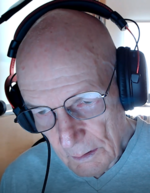User:Robbie: Difference between revisions
No edit summary |
No edit summary |
||
| (50 intermediate revisions by the same user not shown) | |||
| Line 1: | Line 1: | ||
== Robbie's User Page[s] == | == Robbie's User Page[s] == | ||
{{tcbl}} | |||
=== A personal profile for the Tech committee === | |||
<p style="text-indent: 0.13in">After a long academic career, I am living in Princeton, New Jersey, to study and write about the cultural effects of education and technology and to prototype culturally effective uses of digital technologies. </p> | |||
<p style="text-indent: 0.13in">After a long academic career, I am living in | |||
Princeton, New Jersey, to study and write about the cultural effects of | |||
education and technology and to prototype culturally effective uses of digital | |||
technologies. </p> | |||
<p style="text-indent: 0.13in">My interests formed as I earned my B.A. with high | <p style="text-indent: 0.13in">My interests formed as I earned my B.A. with high honors at Princeton University (1957-61) and my Ph.D. at Columbia University (1961-68). Thanks to a good job market, I joined the faculty at the Johns Hopkins University as an Assistant Professor in 1965, and I then moved to the faculty at Teachers College, Columbia University, in 1967. In 2002, I became the John L. and Sue Ann Weinberg Professor in the Historical and Philosophical Foundations of Education there, and 10 years later I retired to study and write full-time.</p> | ||
honors at Princeton University (1957-61) and my Ph.D. at Columbia University | <div style="margin-top: 20px;">[[file:Robbie-with-head-phones-300w.png|right|150px]]<div> | ||
(1961-68). Thanks to a good job market, I joined the faculty at the Johns | <p style="text-indent: 0.13in">As an undergraduate, I became interested in formative education as an agent of cultural change and that topic has remained central to my work. To further this interest, I initially studied the history of political and educational theory and the cultural significance of information and communications technologies. Jacques Barzun and Lawrence A. Cremin sponsored my dissertation, an intellectual biography of José Ortega y Gasset, which the Teachers College Press published as [https://www.dropbox.com/scl/fi/gz9vcxwkakizjcmiyqtd7/1971-Man-and-Circumstances-McClintock.pdf?rlkey=zdjrwdg8a2o01629mtmyobk3s&dl=0 Man and His Circumstances: Ortega as Educator] in 1971. Through the 1970s, writing essays like [https://www.dropbox.com/scl/fi/17xqp3inppj2e90okrfu9/1971-Place-for-Study-McClintock.pdf?rlkey=4ebeedcs47v4mtr2po6e5o18q&dl=0 "Towards a Place for Study in a World of Instruction"] and [https://www.dropbox.com/scl/fi/i88ikb7pcmyi7lm1dktvg/1979-Dynamics-Decline-Education-1979.pdf?rlkey=uibdh7dc7jjf0f7do07vr6abc&dl=0 "The Dynamics of Decline: Why Education Can No Longer Be Liberal"], I developed the view that humanistic educators should try to use digital technologies as disruptive historical forces to strengthen the cultural power of formative education. </p> | ||
Hopkins University as an Assistant Professor in 1965, and I then moved to the | |||
faculty at Teachers College, Columbia University, in 1967. In 2002, I became the | |||
John L. and Sue Ann Weinberg Professor in the Historical and Philosophical | |||
Foundations of Education there, and 10 years later I retired to study and write | |||
full-time.</p> | |||
<p style="text-indent: 0.13in"> | <p style="text-indent: 0.13in">To further that goal at TC, I organized the [https://www.dropbox.com/scl/fi/tmsnr0b84oa1cyns1oq1o/1999-ILT-Plan-McClintock.pdf?rlkey=nq7a825ov4w9hahfkhpbodc43&dl=0 Institute for Learning Technologies] (ILT) in 1984 and directed it until 2002, prototyping advanced curricular resources for use over the Internet. Acting on my ideas about education and historical change, I developed [https://www.dropbox.com/home/0-Gesamtschriften-Robbie?preview=1990-The-Cumulative-Curriculum-Multi-Media-and-the-Making-of-a-New-Educational-System.pdf The Cumulative Curriculum Proposal] (1990-91), which led to two large projects — [https://www.dropbox.com/home/0-Gesamtschriften-Robbie?di=left_nav_browse&preview=1992-Risk-and-Renewal-Dalton-Year-1-Summaries.pdf The Dalton Technology Plan] (1991–1996) and [https://www.dropbox.com/home/0-Gesamtschriften-Robbie?di=left_nav_browse&preview=1996_Eiffel-Project-1-1-McClintock.pdf The Eiffel Project] (1996–2001). I raised over $20 million in gifts and grants to prototype places for study in New York City schools, public and private, and in Columbia University. In two online essays, I wrote about digital technologies as agents of cultural change, [https://www.dropbox.com/scl/fi/jaa81sfrqpd2dgwe5f6q6/1992-Power-and-Pedagogy-McClintock.pdf?rlkey=11m299rgo5d5dzjfw2bsmwk4v&dl=0 Power and Pedagogy] (1992) and [https://www.dropbox.com/scl/fi/um8rmmmxbd1gg6j2n43wu/1999-Manifesto-McClintock.pdf?rlkey=15j1hebdi721jd57j05bfcy83&dl=0 The Educators Manifesto] (1999), and on the eve of the dot-com crash, I wrote [https://www.dropbox.com/home/0-Gesamtschriften-Robbie?di=left_nav_browse&preview=2000-Smart-Cities-New-York-McClintock-1.pdf# Smart Cities — New York: Electronic Education for the New Millennium] (2000), the pedagogical rationale for a very large, ill-fated initiative under-taken by the NYC Board of Education, Accenture, and a consortium of major tech companies.</p> | ||
</p> | |||
< | <div class="inbox" style="align: center; width: 400px; text-align: center;">In "The Accidental Technologist," Joe Levine profiled my technology work in the context of my career.<br> | ||
[https://www.tc.columbia.edu/articles/2010/december/the-accidental-technologist/ <i>TC Today</i>, December 2010].</p></div> | |||
of | |||
[ | |||
<p style="text-indent: 0.13in">Over the past 20 years, I’ve stayed away from | <p style="text-indent: 0.13in">Over the past 20 years, I’ve stayed away from market-driven innovation to concentrate on scholarship and technical initiatives “for their own sake.” In [https://www.dropbox.com/scl/fi/hwto8no5s4dryqn80mjnt/2005-Homeless-Intellect-McClintock.pdf?rlkey=85rlwd3hx28czrpw7juhl99yw&dl=0 <i>Homeless in the House of Intellect: Formative Justice and Education as an Academic Study</i>] (2005), I explored the special importance the academic study of education had at a time when the radical transformation of educational institutions was getting underway. In [https://www.dropbox.com/scl/fi/swqby2yfm80k20knhtxrj/2012-Enough-McClintock.pdf?rlkey=zdddnknc3365wagig8j7q0jxf&dl=0 <i>Enough: A Pedagogic Speculation</i>] (2012), I criticized present-day thinking about education and public life from an imagined perspective, far in the future, when <i>enough</i>, neither <i>too much nor too little</i>, had supplanted the principle of <i>more</i> as the basis for exercising judgment and legitimating authority. Subsequently, I published an extended essay — [https://www.dropbox.com/scl/fi/d3l0f720x75hwi2zqbre9/2019-Formative-Justice-published-paperback.pdf?rlkey=esbx65twjy1wzkc7cdsz18gts&dl=0 <i>Formative Justice</i>] (2019) — that brings the speculations put forward in <i>Enough</i> more concretely into the contemporary context. Since 2019, I have labored to prototype a digital correlate to the personal study or studio that cultured persons with means have used as favored workspaces for many generations — <i><b>a place to study</b></i>. Now the first prototype is offline, a second will go online early 2025.</p> | ||
market-driven innovation to concentrate on scholarship and technical initiatives | |||
“for their own sake.” In | |||
House of Intellect: Formative Justice and Education as an Academic | |||
Study</i>] | |||
of education had at a time when the radical transformation of educational | |||
institutions was getting underway. In | |||
.pdf?rlkey=zdddnknc3365wagig8j7q0jxf&dl=0 | |||
Speculation</i>] | |||
education and public life from an imagined perspective, far in the future, when | |||
<i>enough</i>, neither <i>too much nor too little</i>, had supplanted the | |||
principle of <i>more</i> as the basis for exercising judgment and legitimating | |||
authority. Subsequently, I published an extended | |||
<i>Enough</i> more concretely into the contemporary context. Since 2019, I have | |||
labored to prototype < | |||
study | |||
go | |||
<p style="text-indent: 0.13in">Presently, I’m depressed by the level of anger in | <p style="text-indent: 0.13in">Presently, I’m depressed by the level of anger in us all, and a bit skeptical about the AI buzz. I’ve always thought AI should stand for <b>Augmenting</b> the <b>Intelligence</b> we use to nurture our human fulfillment, an intent I long ago voiced in the <i>American Scholar</i> through “[https://www.dropbox.com/scl/fi/yfb0xr9n560ixr6020kxe/1966-Machines-and-Vitalists-McClintock.pdf?rlkey=czywwdn8m7asggjx9s9xigsy8&dl=0 Machines and Vitalists: Reflections on the Ideology of Cybernetics]” (1966).</p> | ||
us all, and a bit skeptical about the AI buzz. I’ve always thought AI should | |||
stand for <b>Augmenting</b> the <b>Intelligence</b> we use to nurture our human | |||
fulfillment, an intent I long ago voiced in the <i>American Scholar</i> through | |||
“[ | |||
Vitalists: Reflections on the Ideology of Cybernetics]” (1966).</p> | |||
<p style="font-style: normal; text-indent: 0.13in">Still much to do. Here’s to | <p style="font-style: normal; text-indent: 0.13in">Still much to do. Here’s to the future!</p> | ||
the future!</p> | |||
<p align="right" style="line-height: 100%; margin-bottom: | <p align="right" style="line-height: 100%; margin-bottom: 0in;"> | ||
0in">[ | [mailto:robbie@aplacetostudy.org robbie@aplacetostudy.org]<br/>4 Green Leaf Court<br/>Princeton, NJ 08540<br/>646 464-4531</p> | ||
4 Green Leaf | |||
Court<br/> | |||
Princeton, NJ 08540<br/> | |||
646 464-4531</p> | |||
Latest revision as of 12:17, 15 June 2024
Robbie's User Page[s][edit | edit source]
A personal profile for the Tech committee[edit | edit source]
After a long academic career, I am living in Princeton, New Jersey, to study and write about the cultural effects of education and technology and to prototype culturally effective uses of digital technologies.
My interests formed as I earned my B.A. with high honors at Princeton University (1957-61) and my Ph.D. at Columbia University (1961-68). Thanks to a good job market, I joined the faculty at the Johns Hopkins University as an Assistant Professor in 1965, and I then moved to the faculty at Teachers College, Columbia University, in 1967. In 2002, I became the John L. and Sue Ann Weinberg Professor in the Historical and Philosophical Foundations of Education there, and 10 years later I retired to study and write full-time.

As an undergraduate, I became interested in formative education as an agent of cultural change and that topic has remained central to my work. To further this interest, I initially studied the history of political and educational theory and the cultural significance of information and communications technologies. Jacques Barzun and Lawrence A. Cremin sponsored my dissertation, an intellectual biography of José Ortega y Gasset, which the Teachers College Press published as Man and His Circumstances: Ortega as Educator in 1971. Through the 1970s, writing essays like "Towards a Place for Study in a World of Instruction" and "The Dynamics of Decline: Why Education Can No Longer Be Liberal", I developed the view that humanistic educators should try to use digital technologies as disruptive historical forces to strengthen the cultural power of formative education.
To further that goal at TC, I organized the Institute for Learning Technologies (ILT) in 1984 and directed it until 2002, prototyping advanced curricular resources for use over the Internet. Acting on my ideas about education and historical change, I developed The Cumulative Curriculum Proposal (1990-91), which led to two large projects — The Dalton Technology Plan (1991–1996) and The Eiffel Project (1996–2001). I raised over $20 million in gifts and grants to prototype places for study in New York City schools, public and private, and in Columbia University. In two online essays, I wrote about digital technologies as agents of cultural change, Power and Pedagogy (1992) and The Educators Manifesto (1999), and on the eve of the dot-com crash, I wrote Smart Cities — New York: Electronic Education for the New Millennium (2000), the pedagogical rationale for a very large, ill-fated initiative under-taken by the NYC Board of Education, Accenture, and a consortium of major tech companies.
TC Today, December 2010.
Over the past 20 years, I’ve stayed away from market-driven innovation to concentrate on scholarship and technical initiatives “for their own sake.” In Homeless in the House of Intellect: Formative Justice and Education as an Academic Study (2005), I explored the special importance the academic study of education had at a time when the radical transformation of educational institutions was getting underway. In Enough: A Pedagogic Speculation (2012), I criticized present-day thinking about education and public life from an imagined perspective, far in the future, when enough, neither too much nor too little, had supplanted the principle of more as the basis for exercising judgment and legitimating authority. Subsequently, I published an extended essay — Formative Justice (2019) — that brings the speculations put forward in Enough more concretely into the contemporary context. Since 2019, I have labored to prototype a digital correlate to the personal study or studio that cultured persons with means have used as favored workspaces for many generations — a place to study. Now the first prototype is offline, a second will go online early 2025.
Presently, I’m depressed by the level of anger in us all, and a bit skeptical about the AI buzz. I’ve always thought AI should stand for Augmenting the Intelligence we use to nurture our human fulfillment, an intent I long ago voiced in the American Scholar through “Machines and Vitalists: Reflections on the Ideology of Cybernetics” (1966).
Still much to do. Here’s to the future!
robbie@aplacetostudy.org
4 Green Leaf Court
Princeton, NJ 08540
646 464-4531
